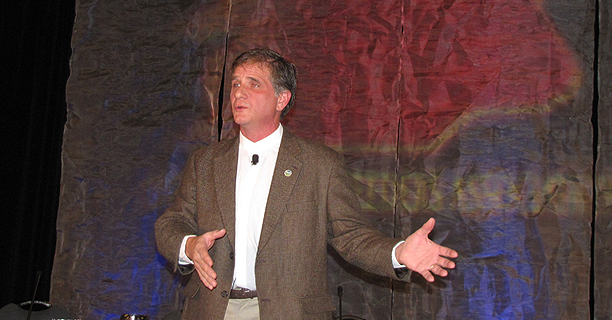
A logger from Montana has a word of advice to help Ontario livestock farmers deal with those who are opposed to their type of business.
Bruce Vincent believes that “activism” should appear on a line in the farm business plan.
He made the comment during his keynote presentation at the 2011 Beef Industry Convention in London.
Vincent has become a well-travelled speaker on the impact of the “timber wars” between loggers and environmentalists in the United States.
Sharing his experience as the co-owner of a family logging company in Libby, Montana, he said people in the timber industry lost their social licence to operate.
“We’re crossing the thin line between environmental sensitivity and environmental insanity,” said Vincent as he explained how “eco-activists” are wielding more influence in the political discussions in rural America.
Not only did opponents of the timber industry build legal and regulatory cases that protected wildlife and the environment, Vincent said the provisions put logging companies out of business. While his company once employed 65 people in a small town of 2,800, he said it now just has three people on the payroll.
“We modified our logging equipment to be firefighting equipment because the option in the northern Rockies is if we’re not going to manage the trees with mechanical means, we’ll use the natural management means, which is fire,” said Vincent, who added that 65 per cent of the wood needs of America is now being supplied by imports.
According to Vincent, the timber industry underestimated the power of the “conflict industry”, which he said has grown into a business. “The biggest problem we have is that they are able to sell their wares,” said Vincent. “What the environmental conflict industry sells is not stewardship…they sell fear,” he said.
Relating his message to the Ontario farming audience, Vincent believes the conflict industry is now turning its attention to businesses that are involved with water and animal agriculture.
To help Ontario farmers keep their “social license to operate”, Vincent asked his audience to remember three truths from his presentation: Democracy works, but it’s not a spectator sport; when people lead, leaders will follow; and the world is run by those who show up.
Vincent also encouraged farmers to be engaged the discussions rather than leave the task to their associations. “What we did wrong in the timber industry is that we thought activism was someone else’s job,” he said.
He suggested that farmers should devote a small portion of their time to activism, which could include activities such as supporting a political candidate, attending planning meetings or speaking at schools.
“Take an hour every week – not out of family time – this is business time. You’ve got to be the people doing the battle,” said Vincent. “I wish we had activism right in front of equipment maintenance… because we would have equipment to maintain right now.”
